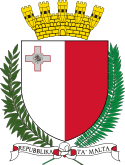- Maltese European Union membership referendum, 2003
-
Malta 
This article is part of the series:
Politics and government of
MaltaRepublicSubdivisionsForeign policy
The 2003 Maltese European Union membership referendum took place on Saturday, 8 March 2003 to decide whether Malta should join the European Union (EU). A narrow majority voted in favour of joining but the opposition Labour Party rejected the result of the referendum. The victory of the Nationalist Party in the 2003 general election confirmed the result of the referendum and Malta joined the EU on 1 May 2004.
The Maltese referendum saw the highest turnout, and the lowest support for joining, of any of the 9 states which held referendums on joining the EU in 2003.[1]
Contents
Background
After the Nationalist Party won the 1998 election they reactivated Malta's membership application, which had been suspended by the previous Labour government.[2] Negotiations to join were finished at the Copenhagen summit in December 2002 and Malta was invited to join the EU in 2004.[3]
The government of Malta announced in January 2003 that a non binding referendum on membership would be held on the 8 March 2003 at the same time as local elections.[4]
Referendum question
The question voted in on in the referendum was confirmed on the 3 January 2003.[5] It was:
Do you agree that Malta should become a member of the European Union in the enlargement that is to take place on 1 May 2004?[6]
Campaign
In the run up to the referendum polls showed voters were evenly divided over EU membership.[7] The Nationalist government argued that Malta would receive EU funds for the roads and tourist industry. They said that Malta needed the EU in order to cope with globalisation and accused the opposition of scaremongering.[8]
The Labour opposition feared that EU membership would cost jobs due to the lowering of trade barriers and jeopardise Malta's independence. They preferred that Malta formed a partnership with the EU rather than seeking membership and called on Maltese votes to either spoil their ballot papers, abstain or vote no. One billboard for the no campaign showed the Prime Minister Eddie Fenech Adami wearing a Diaper made of the flag of Europe.[8][9]
The small Democratic Alternative party and the English language newspapers supported membership.[citation needed] However the largest trade union in Malta, the General Workers' Union opposed membership.[5]
Results
Electorate Spoilt votes Turnout (%) For (%) Against (%) 297,881 3,911 270,650 (90.86) 143,094 (53.65) 123,628 (46.35) Source: The Maltese EU Accession Referendum Aftermath
Supporters of the Nationalist party celebrated the result of the referendum but the Labour leader Alfred Sant did not concede defeat and said the issue would be settled at the upcoming general election.[10] He argued that only 48% of registered voters had voted yes and that therefore a majority had opposed membership by voting no, abstaining or spoiling their ballot. The day after the referendum the Prime Minister called the election for the 12 April as expected, though it was not required until January 2004.[5][11]
The main issue in the 2003 election was EU membership and the Nationalist party's victory enabled Malta to join on the 1 May 2004.[12]
Further reading
- Fenech, Dominic (July 2003). "The 2003 Maltese EU referendum and general election". West European Politics 26 (3): 163–170. doi:10.1080/01402380312331280638.
References
- ^ "Post-Script: The Malta Labour Party after 1998". michaelbriguglio.com. http://www.michaelbriguglio.com/PostscriptJanuary2004.pdf. Retrieved 2008-02-27.
- ^ "Appendix D - Chronology of EU enlargement". www.aph.gov.au. http://www.aph.gov.au/house/committee/jfadt/CentralEurope/ce_report/appendixd.pdf. Retrieved 2008-02-27.
- ^ "The outcome of the Copenhagen Summit". EurActiv.com. 2003-01-15. http://www.euractiv.com/en/enlargement/outcome-copenhagen-summit/article-110360. Retrieved 2008-02-27.
- ^ "Malta first in EU referendum race". BBC Online. 2003-01-29. http://news.bbc.co.uk/1/hi/world/europe/2707317.stm. Retrieved 2008-02-27.
- ^ a b c "Referendum briefing No 2: The Maltese EU accession referendum, 8 March 2003". Opposing Europe Research Network. http://www.sussex.ac.uk/sei/documents/maltese2.pdf. Retrieved 2008-02-26.
- ^ "Malta votes to join EU". London: The Daily Telegraph. 2003-03-09. http://www.telegraph.co.uk/news/main.jhtml?xml=/news/2003/03/09/umalta.xml. Retrieved 2008-02-26.
- ^ "Malta voting on EU membership". CNN. 2003-03-08. Archived from the original on 5 February 2008. http://web.archive.org/web/20080205103605/http://www.cnn.com/2003/WORLD/europe/03/08/malta.euvote.ap/index.html. Retrieved 2008-02-27.
- ^ a b Owen, Richard (2003-03-10). "Malta to join EU after knife-edge referendum". London: The Times. http://www.timesonline.co.uk/tol/news/world/article1117985.ece. Retrieved 2008-02-27.
- ^ "Malta awaits EU membership verdict". CNN. 2003-03-09. http://edition.cnn.com/2003/WORLD/europe/03/09/malta.euvote.ap/. Retrieved 2008-02-27.[dead link]
- ^ "Malta votes 'yes' to EU membership". CNN. 2003-03-09. http://www.cnn.com/2003/WORLD/europe/03/09/malta.yes/. Retrieved 2008-02-27.[dead link]
- ^ "Malta PM hopes to ride EU success". CNN. 2003-03-10. http://www.cnn.com/2003/WORLD/europe/03/10/malta.prime.minister.reut/index.html. Retrieved 2008-02-27.
- ^ "Election Results Move Malta Closer to European Union". The New York Times. 2003-04-14. http://query.nytimes.com/gst/fullpage.html?res=9900E2D7133BF937A25757C0A9659C8B63. Retrieved 2008-02-27.
General elections European elections Local elections Referendums Categories:- 2003 referendums
- Referendums in Malta
- Referendums related to European Union accession
- 2003 in Malta
- 2003 in international relations
- 2003 in the European Union
- 2003 elections in Europe
- Malta and the European Union
Wikimedia Foundation. 2010.
